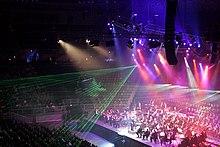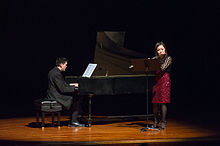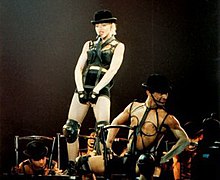How Many Times Do People Go to a Performing Arts Concert Per Year



Later on the performance has ended; showing stage clutter such as microphone stands, drinks, cables, speakers (2013)
A concert is a live music operation in front of an audience.[1] The performance may be past a single musician, sometimes then called a recital, or by a musical ensemble, such as an orchestra, choir, or band. Concerts are held in a wide variety and size of settings, from private houses and small nightclubs, dedicated concert halls, amphitheatres and parks, to large multipurpose buildings, such as arenas and stadiums. Indoor concerts held in the largest venues are sometimes called arena concerts or amphitheatre concerts. Breezy names for a concert include show and gig.
Regardless of the venue, musicians usually perform on a stage (if non actual then an expanse of the floor designated every bit such). Concerts ofttimes require alive result support with professional audio equipment. Before recorded music, concerts provided the main opportunity to hear musicians play. For large concerts or concert tours, the challenging logistics of arranging the musicians, venue, equipment and audience (ticket sales) are handled by professional bout promoters.
Many musicians performing in large venues or to a mass audience through electronic media feel phase fright or performance feet. The psychological stress of maintaining performance at a high level over a long concert tour is associated with depression and substance corruption. Mod rock concerts are often conducted at extremely high volume levels, most the threshold of hearing loss. The intensity of the sound surround and the trounce of the mass audience induces a trance-like psychological country in some audience members, and beyond the music itself, functions equally an entry signal to reach an altered state of consciousness. Vocalists and other musicians (if their instrument permits this) will frequently dance or strut on stage every bit they perform, and the audience will frequently dance or sway in response (space permitting); this can also be considered a manifestation of crowd psychology. In some concert settings, such as classical music, the audience participates passively. In other concert settings, specially folk or rock concerts, the performers encourage and engage with an active audience response.
History [edit]
While the first concerts didn't officially appear until the belatedly 17th century, similar gatherings had been around throughout the 17th century at several European universities, such as Oxford and Cambridge. Officially, though, the beginning public concerts that required an access were created past the English violinist, John Banister.[ii] Over the next few centuries, concerts began to proceeds larger audiences, and classical symphonies were very pop. Finally, after World War 2, these events changed into the modern concerts that take place today. An example of an early, postal service-WW2 concert is the Moondog Coronation Ball.[3]
17th century [edit]

The first known occurrence of concerts where people are charged access took place at violinist John Banister'south home in Whitefriars, London in 1672. 6 years later in 1678, a man past the proper name of Thomas Britton held weekly concerts in Clerkenwell. Yet, these concerts were unlike. Before, you had an access that you paid upon entering the edifice where the concert was held but at Britton's concerts, patrons purchased a yearly subscription to come to the concerts. At 10 shillings a yr, people could meet as many concerts they wanted to.
In addition to holding concerts at certain venues, concerts also went to the people. In 17th century French republic, concerts were performed in the homes of the nobility, for only the nobility. Organized by Anne Danican Philidor, the first public concerts in France, and arguably the world, were the Concerts Spirituels. These concerts were held on religious holidays when the Opera was closed and served every bit a model for concert societies all over the world.
18th century [edit]
In the late 18th century, music from the likes of Haydn and Mozart was brought and performed in English concerts. One notable piece of work from Haydn performed at these concerts was his set of 12 symphonies, also referred to as the London Symphonies. Concerts reflecting the elegance of England during the fourth dimension menstruum were held at the gardens of Vauxhall, Ranelagh, and Marylebone. The musical repertoire performed at these events ranged from works composed by young Mozart, to songs that were pop in that time flow.
Types [edit]

The nature of a concert varies by musical genre, private performers, and the venue. Concerts by a small-scale jazz combo or modest bluegrass band may take the same order of program, mood, and volume—but vary in music and clothes. In a similar way, a detail musician, band, or genre of music might attract concert attendees with similar apparel, hairstyle, and behavior. For example, concert goers in the 1960s frequently had long hair (sometimes in dread lock form), sandals and inexpensive wearable fabricated of natural fibers. Regular attendees to a concert venue might besides have a recognizable mode that comprises that venue'south scene.
Recital [edit]
A recital is a concert by a soloist or small group which follows a programme. Information technology can highlight a unmarried performer, sometimes accompanied by piano, or a performance of the works of a single composer, or a single musical instrument (organ recital). The invention of the solo pianoforte recital has been attributed to Franz Liszt.[4] Likewise, a recital may have many participants, every bit for a dance recital. A trip the light fantastic toe recital is a presentation of choreographed moves for an audience, usually in an established performing arts venue, possibly competitively. Some dance recitals are seasonal.
Theatrical [edit]

A theatrical concert by Madonna in 1990
Some performers or groups put on very elaborate and expensive shows. To create a memorable and heady temper and increase the spectacle, performers ofttimes include additional entertainment devices. These can include elaborate phase lighting, electronic imagery via (IMAG) system and/or pre-recorded video, inflatable sets, artwork or other set pieces, various special effects such equally theatrical smoke and fog and pyrotechnics, and unusual costumes or wardrobe. Some singers, specially popular music, augment concert sound with pre-recorded accessory, back-up dancers, and even broadcast vocal tracks of the singer's ain phonation. Activities during these concerts tin can include dancing, sing-alongs, and moshing.
Classical [edit]
Classical concerts embody two dissimilar styles of classical music — orchestral and choral. They are performed past a plethora of different groups in concert halls or other performing fine art venues. For orchestra, depending on the number of performers and the instruments used, concerts include chamber music, sleeping accommodation orchestra, or symphony orchestra. Bedroom orchestra is a pocket-sized-scale orchestra containing betwixt ten and xl members, mostly string instruments, and likely led past a conductor. Symphony orchestra, on the other manus, is a large-scale orchestra that can have up to eighty or more members, which is led by a usher and is performed with instruments such as strings, woodwinds, brass instruments, and percussion.[5] For choral way pieces, concerts include Choral music, Opera, and musical theater. Each encompassing a variety of singers who are organized past a conductor or director.[half-dozen]
Venues [edit]

At that place are a wide variety of concert venues that tin range in size, location, and the blazon of music that is hosted at that particular venue. A concert hall is a concert venue which hosts mainly classical music such equally a symphony, and they are frequently a part of a larger performing arts center. I of the most famous concert halls is Royal Albert Hall located in the United Kingdom. This venue hosts a broad variety of genres of music from classical concerts to popular concerts. An amphitheater is an uncovered circular or oval-shaped venue with tiers of seats surrounding the stage. Amphitheaters such as the well-known Ruddy Rocks Amphitheatre,[7] located in Colorado, hosts mainly rock and pop concerts. Rock and pop concerts, withal, are mainly held in sports stadiums and arenas such as Madison Foursquare Garden because of the tendency for these stadiums to accept a larger chapters.
After the outbreak of coronavirus (COVID-19), there are a lot of online concert venues to back up creative person. Some are live streamed like Jambase and others are pre-recorded and paid. Riffbook.org as The Hindu [8] says is 1 of the first such websites to come up out of Bharat to support independent artists. There are many such across the earth.
Formats [edit]
Festivals [edit]

Concerts involving a greater number of artists, specially those that last for multiple days, are known as festivals. Dissimilar other concerts, which typically remain in a single genre of music or work of a particular artist, festivals often cover a broad scope of music and arts. Due to their size, festivals are almost exclusively held outdoors. New platforms for festivals are becoming increasingly popular such as Jam Cruise, which is a festival held on a cruise ship, as well as Mayan Holidaze, which is a destination festival held in Tulum.
Tour [edit]
A concert tour is a series of concerts by an artist or grouping of artists in different cities, countries or locations. Often concert tours are named, to differentiate different tours by the same creative person and associate a specific tour with a particular album or product (for example Ariana Grande: Sweetener World Tour, BTS: Dearest Yourself Earth Bout, Michael Jackson: Dangerous Earth Tour). Especially in the popular music world, such tours can go big-scale enterprises that last for several months or fifty-fifty years, are seen by hundreds of thousands or millions of people, and bring in millions of dollars (or the equivalent) in ticket revenues.
Residency [edit]
A concert residency[nine] or musical residency[x] is a serial of live music concerts like to a concert tour, but only performed at one location.
Revenue [edit]
While admission to some concerts is free, it is common practice to charge money for concerts past selling access tickets. Before the advent of recorded-music sales and mechanical royalties in the early 20th century, concerts were the main source of acquirement for musicians. Revenue from ticket sales typically goes to the performing artists, producers, venue, organizers and the brokers. In the example of benefit concerts, a portion of profits oft go towards a charitable organization.[ citation needed ]
Additional revenue is too often raised through in-concert advertising, from free local concerts for local sponsorships to sponsorships from corporations during major tours e.g. 2009'due south "Vans' Warped Tour Presented by AT&T". Both Vans and AT&T would have paid pregnant amounts to take their company names included at the forefront in all marketing material for the Warped Tour.[ citation needed ]
Concessions and trade are also often sold during and after concerts; often by the venue in the case of the former, and by the performing band or artist in the instance of the latter.[eleven]
Omnipresence [edit]

The term "full firm" is used to designate full occupancy by the audition of every seat or place at a venue. It besides applies to theatrical productions and cinemas.[12] [13]
As of 2017[update], Italian vocaliser Vasco Rossi holds the tape for the biggest attendance of a ticketed concert with a total of 220,000 tickets sold for his show at Enzo Ferrari Park, Modena, Italy on ane July 2017.[fourteen] [15] The tape was previously held by Paul McCartney's 1990 concert with a paying audition of 185,000 in Maracanã Stadium, Rio de Janeiro.[xvi] Rod Stewart also holds the record for the biggest attendance in a costless concert, with an estimated audience of three.five million during his 1994 New Year's Eve concert in Copacabana Embankment, Rio de Janeiro.[17]
Meet also [edit]
- Concert version
- Concerto
- Ecology impact of live music
References [edit]
- ^ Bennett, Michael Y. (fourteen July 2017). Analytic Philosophy and the World of the Play. London: Routledge. p. 88. ISBN978-1138239920.
- ^ "John Banister | English musician". Encyclopedia Britannica . Retrieved 2019-03-27 .
- ^ "Concert | music". Encyclopedia Britannica . Retrieved 2019-03-20 .
- ^ "How Franz Liszt Became The World's Offset Rock Star". NPR.org. Oct 22, 2011. Retrieved 17 January 2014.
- ^ Gaur, Aakanksha (2015-04-28). "Orchestra". Interlude.hk . Retrieved 2019-03-21 .
- ^ "Kinds of Concerts: How To Savor A Live Concert". naxos.com . Retrieved 2019-03-20 .
- ^ "Top ten Music Venues in the The states". Atlanta Establish of Music and Media . Retrieved 2019-03-twenty .
- ^ Philip, Susan Joe (xix May 2020). "Prepare for online indie concerts". The Hindu.
- ^ McIntyre, Hugh. "Forget Vegas, New York City Has Go The New Become-To City For Concert Residencies". forbes.com . Retrieved 4 December 2017.
- ^ "Las Vegas Residencies: Here's Your Guide to Summertime 2017". ew.com . Retrieved four Dec 2017.
- ^ Ditommaso, Anna (7 November 2018). "Tips for Selling More than Band Trade". AudioTheme.com . Retrieved 6 Nov 2019.
- ^ Tomlinson, Roger; Roberts, Tim; Allpress, Vicki (2006). Full Business firm: Turning Data into Audiences (PDF). CreativeNZ. ISBN0-478-18554-5.
A revised and updated edition of Battle Clever written past Roger Tomlinson and originally published by Arts Council England in 1993.
- ^ "full business firm". Cambridge English Lexicon . Retrieved 22 March 2022.
- ^ "Vasco Rossi, Modena Park da record mondiale: 220.000 paganti". vh1.it. 24 May 2017. Retrieved 4 December 2017.
- ^ Gottfried, Gideon (29 June 2017). "Rossi Sets Record In Italy". Pollstar . Retrieved ix December 2017.
- ^ "Arts and Media/Music Feats & Facts/Solo Rock Prove Crowd". 25 May 2006. Archived from the original on 25 May 2006. Retrieved ix Dec 2017.
- ^ "Arts and Media/Music Feats & Facts/Huge Free Gig". 25 May 2006. Archived from the original on 25 May 2006. Retrieved 14 Dec 2017.
External links [edit]
| | Wikimedia Commons has media related to Concerts. |
| | Wikiquote has quotations related to: Concert |
- Hartman, Mitchell (August 31, 2015). "I've E'er Wondered: 'The Travellin' Band'". Marketplace . Retrieved September 1, 2015. A piece on the economics of touring.
Source: https://en.wikipedia.org/wiki/Concert
0 Response to "How Many Times Do People Go to a Performing Arts Concert Per Year"
Post a Comment